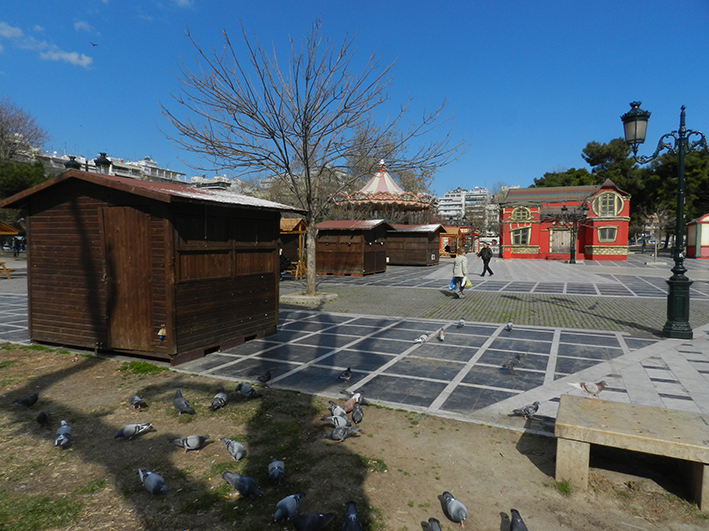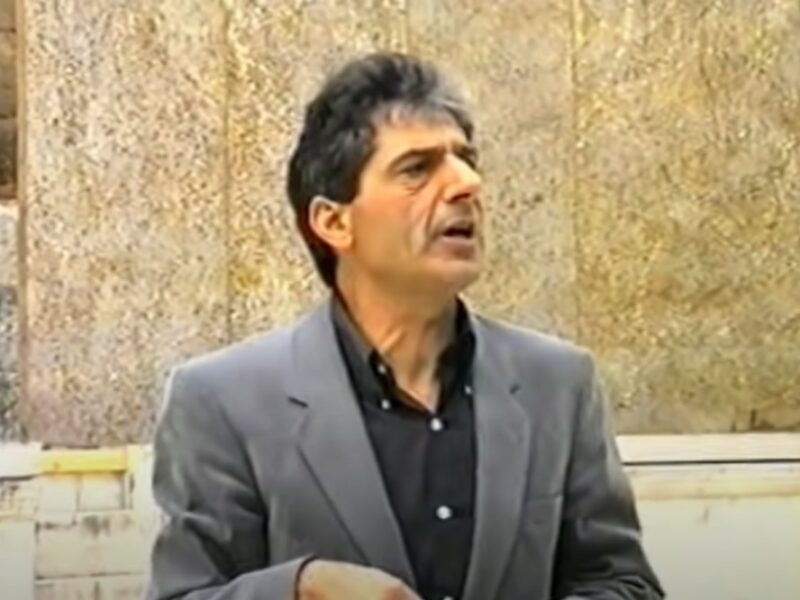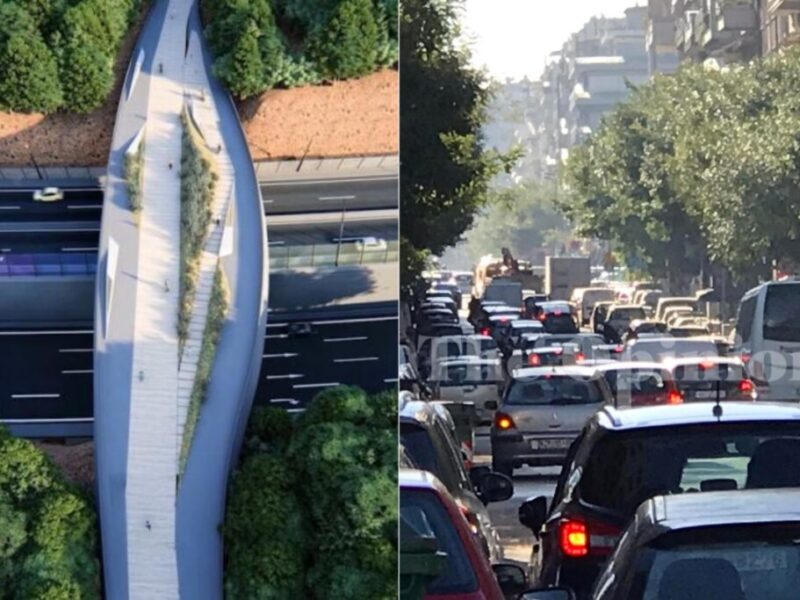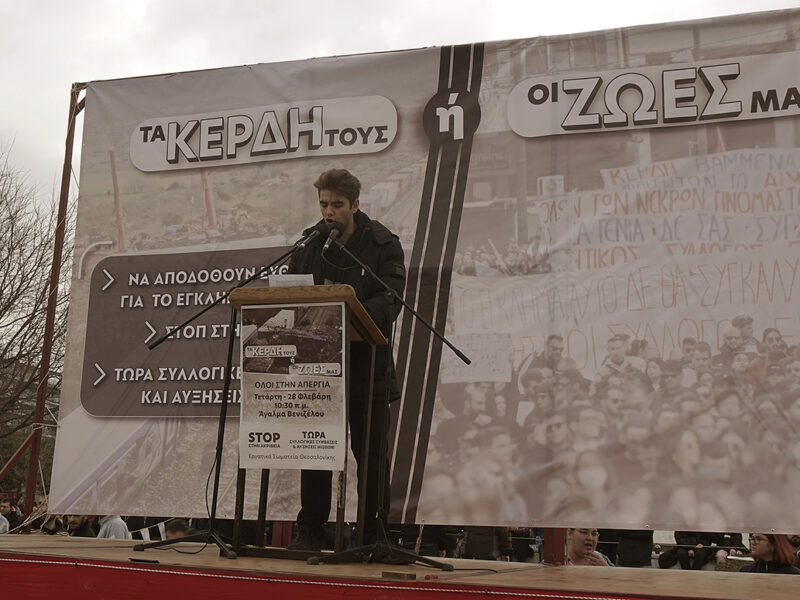a gathering place of humans and ideas
written by Giannis Fragoulis
(psychoanalyst-psychotherapist)
translation: Charikleia Tsaousi
We continue our report about the commercialization of human’s daily life, trying to see, in this political practice the alienation and the deficit freedom into space and time, making a report at Aristotelous square, in an effort of its transformation in a huge shopping mall.
CHARACTER
Aristotelous square, as it is prevailed to name the square series from church of Saint Demetrius to sea, is and was the inhabitants” meeting place of this city. Moreover, it was the road which was bringing the human who wanted to travel or to move to sea, to port. Its importance is manifold. The experiential route of an inhabitant towards a place where he is about to meet with other of his fellow inhabitants or not, as the one which pushes it away in order to get a life beyond, in another place, stigmatised by some specific characteristics.
At first, we have the route which has as a target to be found this human with another, to exchange ideas, to be able that each of these is going to form an opinion about a topic, to get to know with each other better, and eventually, to develop a love affair. So, as we see, in this way is forming the social fabric’s consistency, here, but also less in other places of this city, develops and involves the essence of the city, in order we to be able to talk about the city of Thessaloniki’s inhabitants, and not about the city of Thessaloniki, in the sense that the city belongs to its inhabitants, to its archeological deme, and not to its geographical characterization.
At second, here are developing the commercial relations. Financial deals are making, someone finds a job, the main city without its suburbs is fed on with what maintains it, money. It is not by chance that Roman agora is located under the church of Saint Demetrius where the ancient Greek palaestra was, meeting places of the inhabitants” city with all of the characteristics we also meet today.
If, on the other hand, we take a walk today crossing the square in order to reach the sea, we will see companies of friends who gather and do exactly the same things that inhabitants” of this city used to do, centuries before.
It is self-evident that human needs to be related with the other for many different reasons. This need is dictated by his instinct and it can not be done easily to be inhibited by someone.
Thirdly, this route has stigmatized by the human’s need to find a better luck, in other places, thinking always the place of his origin. Homesickness is being captured in every place of this itinerary and Aristotelous square is stigmatized as a look that someone sends from sea to Ano Polis, something that hides in it nostalgia.
THE ATTEMPT OF ITS DESTRUCTION
Ending 2019 began an other use of this square. Its part which is located above the Egnatia avenue and under the Filippou street hosted draft prefabricated buildings where corporations were operated in an overall structure which was named as “Santa Clauses” village”.
This had been done before, while, this time the buildings in question had left over the intended time. This plan was of Thessaloniki’s county. Let’s see, though, what the mayor himself announced in a press conference he gave.
“These facilities, but mainly the bustle in that area, we want to stay forever. I believe that we are not the ones” who want it, but all the neighbors. The successful experiment of the Christmas market and the healthy mobility which caused by the end of November until the early January we want to be continued. And, in there, issues arrise with the regulatory framework. In fact, I have spoken with the appropriate Minister, Adonis Georgiadis, Minister of Developement who is going to form a different framework. Ensuring that, the counties will be able to create similar markets. The target is in these buildings, in that area, constantly to be made good uses which have to do with shopping, with activities, either it has to do with carnivals or Easter or Christmas or concerts.
What we wanted to do in parallel with the Christmas celebration was to gain back the square of Courts. Taking back places of our city which were abandoned and it had been misused.”. He referred to the carnival : “I repeat, good (square) uses pushes misuses. We want to do it and this indicates precisely residence and not abandonment of those buildings as well as of the amusement park. We want exactly (this) to maintain the uses. Soon enough we are going to have another usage of the space, every ten days, every twenty (days) in order to have the ability to bustle at these areas in the next festival period in which is carnival. It will be also carnival celebrations either events in that area exactly so that to exist people and any policing.”.

In reference of the buildings” residence at the spot : “They will remain there if there is ability to utilize from each exhibition in order for us to be able to utilize them. Being so a motive to various exhibitions and actions can be done.”. The Mayor lately thanked the greek police for its contribution about its job at Democracy square. Of course, the carnival exhibitions did not take place because of draft design and cancelled for the next year!
THE GENERALIZATION OF THE SITUATION
We can see that the county has taken into consideration business world’s requests and accepted the permanent settlement of businesses in this square. If we read between the lines we will see that he admitted that this functioning is illegal and machinated a consultation with Adonis Georgiadis- known for the expedience of operational concession to private capital unconditionally- so that this experiment could be attempted generally both to the county of Thessaloniki, to other common areas, but also to other counties across the country, so that we could have a generalized plan, In other words, the common area which was free for use is limited to a minimum. Aristotelous square would have as a free-range only the park under the church of Saint Demetrius and the area around the playground at Filippou street. Also, the use of this playground would be problematic, because of the noise, which annoys the neighbors, and because of the bustle it creates an insecurity to the parents about their children who are not going to play carefree anymore. In the end, the space, useful as we mentioned before for, the reconstruction of social fabric and the identity of each human separately, it will be limited so that the one who is going to use it will be in eclipse of use which is going to be characterized as freight operation.
But what that means? It will be included, endly, in unconscious, especially of young people, that the entertainment will be identified as a commercial usage. In other words, equalization entertainment=commercial usage=mold of human’s character and social’s fabric creates consumer man who from now on will be the subject of specific companies” choices, and as a result the main character of each human is homogenized, specified by the capital’s choices, human’s perception is limited, greek society follows the Western model in which human operates through stressful rhythms of the market, is depressed and eliminated when he has no ability to consume.
So, we reach to the corrosion of greek society in which the definition of human who is led hither and thither by the laws of the market, will be incapable to react in choices which they will be destructive for him, society and the environment. Furthermore, the neighbors just can’t be satisfied according to these functions, as we verified to our report.

WHICH BACKLASH WILL BE?
How humans are about to react? This is the main question. The danger is the citizens of other areas who are away from Aristotelous square not to care about. Maybe they will think of having a low-cost entertainment and “easy” which, additionally, can be combined with possible markets. They will not be suspected that something proportional as this, can be easily done in other communal areas in Thessaloniki’s town, and the surrounding counties. Afterwards, other counties of Greece will follow. Then, an irrational rivalry is about to exist between the citizens round (the) Aristotelous square and the potential customers of a specific mall as it is going to build.
We have also to see that in the future with the installation of machines space will be fenced, free entrance will be forbidden in this space as it happens with the facilities of TIF, when proportional fairgrounds take place.
Are we going to let our lives be ware? Are we going to stay viewers in the catastrophe of the social fabric and our identity? Are we going to take life in our hands? The answer to all these questions is that we want the harmonious operation of commercial circle with free spacetime.
We want to be the ones who arrange our lives and not the market logic whatever that means. We have reached a point that we can not take a step back, we are not allowed due to respect to our life and due to our obligation to deliver a society to our children human, democratic and liberal in real and not in an economistic sense.
Will people react and will denounce Zerva’s politics or (people) will be sheep in a municipal governance who obey in capital’s choices? Near future will show us. We are circumspect about the reactions, we wait for the tactics of public authority and the opposition parties. We will recur.




